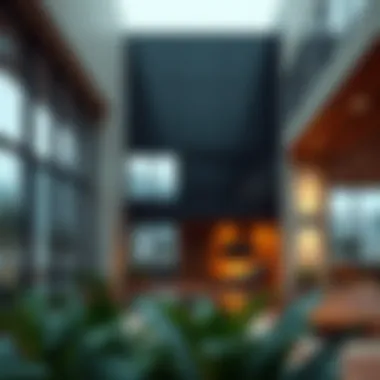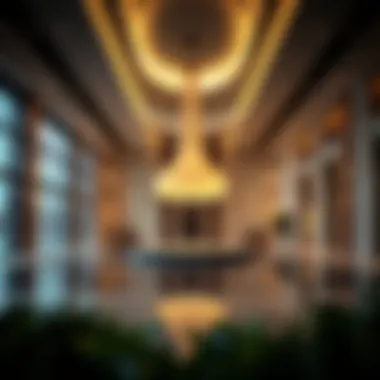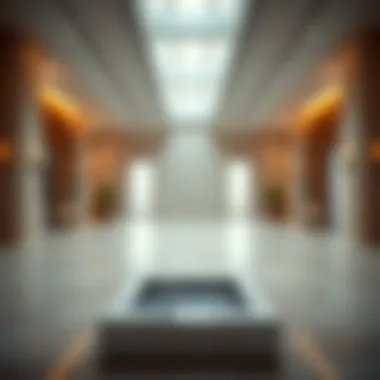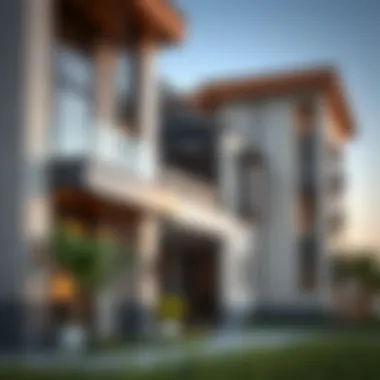Waterproofing Contractors in Dubai: A Complete Guide


Intro
In the bustling construction scene of Dubai, the role of waterproofing contractors cannot be overstated. This city, often characterized by its stark heat and occasional heavy rains, demands a keen eye for detail when it comes to building structures that can withstand the elements. Whether you're involved in residential properties or massive commercial edifices, waterproofing is a non-negotiable aspect that directly influences longevity and durability.
Understanding waterproofing services isn't just for contractors and architects; it’s crucial for investors, homeowners, and developers alike. Selecting the right contractor can mean the difference between a stable, serene living space and a leaky disaster waiting to happen. In this section, we will delve into the nuances of waterproofing contractors in Dubai, illuminating their significance, methods, and the critical role they play within the construction industry.
This guide will walk you through vital aspects, from market trends to strategic investment considerations, providing a holistic view that will educate and empower you as you navigate the often complex world of waterproofing in the UAE.
The Importance of Waterproofing in Construction
Waterproofing stands as a key pillar in the construction landscape, particularly in a climate like Dubai's. The combination of humidity, extreme temperatures, and seasonal rain can create a perfect storm for water damage. In this setting, the significance of waterproofing cannot be overstated; it’s a matter of both structural integrity and peace of mind.
Understanding Water Intrusion
Water intrusion is essentially the unwanted flow of water into structures, be it through the roof, walls, or foundation. This phenomenon often occurs when materials age, or when contractor work fails to meet quality standards. Erosion, cracks, and deteriorated seals become gateways for water.
In Dubai, the risk is further heightened by the unique geographical and environmental aspects. For instance, underground water tables can fluctuate with weather patterns, leading to unexpected water pressure on basements or foundations.
To combat these issues, waterproofing solutions such as membranes, coatings, and drainage systems are employed to act like a barrier, effectively blocking any static or flowing water from breaching a structure. Understanding how water intrusion works can be critical for contractors and homeowners alike, as prevention begins with awareness.
Consequences of Poor Waterproofing
When waterproofing is neglected or poorly executed, the repercussions can be serious and far-reaching. Some consequences include:
- Structural Damage: Over time, trapped moisture can compromise the materials used in construction, leading to wood rot, corrosion of steel reinforcements, or weakened concrete.
- Health Hazards: Mold and mildew thrive in damp conditions, posing health risks to residents. This can lead to respiratory problems, allergic reactions, and deterioration of indoor air quality.
- Higher Repair Costs: The saying 'an ounce of prevention is worth a pound of cure' rings true here. Addressing the aftermath of water damage can incur costs far beyond initial waterproofing investments.
"Investing in waterproofing is not just a roof over your head; it’s an investment in your future comfort and financial well-being."
Failure to recognize the need for quality waterproofing can turn into a ripple effect, with minor leaks developing into severe flooding eventually. Real estate investors and homeowners in Dubai should view waterproofing not just as an afterthought but as a foundational aspect of construction that ensures longevity and sustainability of their properties.
In summary, addressing waterproofing during the construction phase is crucial. A sound waterproofing strategy creates a shield against nature's unexpected ways, thus safeguarding investments and enhancing safety.
Overview of the Waterproofing Industry in Dubai
The waterproofing industry in Dubai stands as a pillar of the construction sector, resonating deeply with the unique climatic challenges and architectural demands of the region. Understanding this industry is essential not only for investors and developers but also for homeowners who seek longevity and durability in their properties. In a place where the heat can be relentless and rain can be sporadic yet heavy, waterproofing becomes more than just a precaution; it’s a necessity.
The demand for waterproofing services in the city has burgeoned, driven by the continuous growth of infrastructure projects and an increasing emphasis on quality. More than just a protective layer, effective waterproofing helps safeguard buildings from moisture-related damages which could lead to costly repairs down the road. A well-waterproofed building is a sound investment, ensuring that both residential and commercial properties remain dry and structurally sound, thus preserving their market value.
Market Demand for Waterproofing Services
With Dubai’s skyline continuously evolving, there’s an inherent demand for waterproofing services that mirrors this growth. Major developments, including luxurious residential complexes and innovative commercial spaces, necessitate a keen focus on waterproofing techniques. This demand is sparked by several factors:
- Increasing Construction Rate: Dubai is home to ongoing large-scale projects such as the Dubai Creek Tower and numerous residential skyscrapers. Each new development calls for robust waterproofing solutions.
- Climate Consideration: The city’s high temperatures and occasional heavy rains require specialized waterproofing strategies to counteract potential intrusions that could yield damage.
- Regulatory Compliance: Property developers are abiding by strict local regulations that mandate certain standards for watertightness in structural designs. As a result, contractors who can deliver compliance alongside quality are in high demand.
- Consumer Awareness: Homeowners and investors are becoming increasingly educated about the importance of quality waterproofing. They recognize the value it adds, pushing the demand for skilled contractors.
This high demand signifies an opportunity landscape for contractors who can adapt to the evolving needs of the market. Furthermore, businesses that invest in contemporary materials and technologies find themselves at an advantage.
Regulations and Standards in Dubai
The framework of regulations surrounding waterproofing in Dubai is integral to ensuring building safety and sustainability. Various local and national regulations exist that govern water resistance measures within the construction industry.
- Dubai Municipality Codes: The Dubai Municipality outlines stringent guidelines on the waterproofing methods that developers must adhere to. These codes are part of a broader plan to enhance safety and longevity in buildings across the city.
- International Standards: Many contractors turn to internationally recognized standards such as ISO and ASTM to structure their approaches to waterproofing solutions. Those who follow these codes often produce high-quality results that comply with both local laws and global practices.
- Certification Processes: Regular inspections and certifications are necessary for waterproofing work. This ensures that contractors maintain quality and proper installation techniques throughout the construction phase.
In addition, continual training on the latest technologies and methods is essential for contractors. This proficiency not only ensures compliance but also guarantees that the workmanship meets the expectations of discerning clients who demand excellence in every aspect of their properties.
"Understanding the regulatory landscape is vital for anyone involved in the construction industry in Dubai. It shapes not just project designs but also the future market viability of the properties created."
As the industry grows and standards evolve, contractors must remain adaptive and educated, ensuring they are always prepared to meet the demands of this dynamic market. This proactive approach will define success in Dubai’s increasingly competitive waterproofing arena.
Types of Waterproofing Solutions


Waterproofing is a fundamental process in protecting buildings and structures from moisture intrusion. In Dubai's unique climate, characterized by extreme heat and occasional rain, selecting the proper waterproofing solution is paramount. Various techniques and materials exist, each with its own set of benefits and considerations. Understanding these types can help in making informed decisions, ensuring that investments in property are safeguarded against water-related damages.
Liquid Waterproofing Membranes
Liquid waterproofing membranes are a popular choice among contractors in Dubai. These membranes are applied as a liquid and then cure to form a seamless, flexible barrier, effectively preventing water seepage.
- Benefits:
- Instant bond: They create a solid bond with the substrate, so there's no room for leakage.
- Flexibility: These membranes can expand and contract with the structure, reducing the risk of cracking.
Homeowners and builders often prefer liquid membranes because they can easily be applied to irregular surfaces, ensuring every nook and cranny is covered. However, maintaining a controlled environment during application is necessary, as extreme temperatures can affect curing.
Sheet Membrane Solutions
Sheet membrane solutions consist of applied sheets made from synthetic materials, typically adhered or mechanically fastened to a surface. They're often used for both below-grade applications and above the ground.
- Benefits:
- Durability: Sheet membranes are tough and resistant to punctures, making them suitable for heavy-duty applications.
- Ease of installation: They can be quickly rolled out, saving time on the job.
However, proper surface preparation is crucial. If not installed correctly, these membranes can be prone to moisture retention between the layers, leading to potential failures. It’s advisable to work with a reliable contractor to ensure that the installation meets all necessary standards.
Cementitious Waterproofing
Cementitious waterproofing is one of the oldest methods still widely used in the industry. This solution involves using a cement-based mix that creates a watertight barrier when applied.
- Benefits:
- Cost-effectiveness: Generally, this is one of the more affordable options available.
- Compatibility: It can be applied to various substrates, making it suitable for both internal and external surfaces.
Despite its positive attributes, cementitious waterproofing is less flexible than other types. This characteristic means that it is not ideal for areas that experience significant structural movement or cracking, which can develop in a hot climate. Proper assessment of the building's movement is vital.
Bituminous Coatings
Bituminous coatings are another effective waterproofing solution, made from modified asphalt. They’re typically used on roofs, basements, and other surfaces prone to water exposure.
- Benefits:
- UV protection: These coatings provide excellent resistance to UV rays, making them suitable for Dubai's harsh sun.
- Easy application: They can be easily applied via brushes or rollers.
Nonetheless, there’s a potential trade-off. With high temperatures, they might become too soft, which could lead to surface damage. It's wise to discuss the specific conditions of your site with your contractor.
Drainage Systems
A comprehensive waterproofing strategy often incorporates drainage systems, which help manage water that could infiltrate a structure. They guide rainwater away from foundations and roofs before it has a chance to cause harm.
- Benefits:
- Enhanced protection: A well-designed drainage system can significantly reduce moisture buildup around the structure.
- Longevity: This proactive approach can extend the life of waterproofing materials.
Investing in a good drainage system is like having an insurance policy for your building. Although it may not be the most glamorous aspect of waterproofing, it plays a critical role in maintaining the integrity of the structure.
"A stitch in time saves nine." This old saying rings true for waterproofing; investing in the right solution now could save costly repairs later.
Choosing the Right Waterproofing Contractor
Selecting a waterproofing contractor is not just a checkbox in the construction process; it truly is a pivotal decision that can determine the durability and safety of a property. The harsh climate conditions in Dubai heighten the stakes—here, the right waterproofing can mean the difference between a reliable structure and a costly disaster. Homeowners, developers, and investors need to ensure they're entrusting this critical task to professionals who not only have the skill set but also the local knowledge required to face the unique challenges presented by the environment.
Assessing Experience and Expertise


When it comes to waterproofing, experience is often the gold standard. A contractor’s portfolio should provide a comprehensive view of their capabilities and past projects, showcasing not just the breadth of their work but also their successful handling of various challenges. A seasoned contractor in Dubai understands the specific concerns that arise in the region, such as the saline nature of groundwater or the heavy summer rains.
- Look for Specialized Skills: Different waterproofing methods require specific expertise. For instance, if a contractor specializes in liquid waterproofing membranes, it illustrates a focused skill set that could be beneficial depending on your project needs. A wide skillset might seem appealing, but depth in experience with key techniques can often yield better results.
- Inquire about Certifications and Training: Many contractors participate in ongoing education to stay current with best practices and emerging technologies. Ask about any certifications from recognized professional organizations that can vouch for their industry standing.
Checking References and Reviews
Don't take a contractor’s word for it—dive into their past work. References and online reviews are invaluable resources that can reveal a contractor's reliability and quality. Speak with former clients to gain insight into their experiences. A few guiding questions could include:
- How did the contractor manage communication and project timelines?
- Were there any unexpected issues, and how were they handled?
- Would they engage the contractor for another project?
Personal anecdotes can offer glimpses into a contractor’s work ethic and problem-solving abilities. Websites like Zillow and Angie’s List also provide vetted reviews that can give a broader picture of what to expect.
"The difference between a good job and a terrible affair often lies in the contractor's attention to detail and adaptability during the project."
Evaluating Cost vs. Quality
In a competitive market like Dubai, prices can vary widely among waterproofing contractors. However, it is vital to remember that the cheapest option isn’t always the best. Sacrificing quality for a lower price can lead to even greater costs in repairs and maintenance down the road.
- Get Multiple Quotes: Soliciting several estimates helps you gauge what a fair price looks like in the current market. A detailed breakdown of materials, labor, and warranties can clarify why variations in costs occur.
- Consider Long-Term Value: Investing in quality materials and skilled labor can protect your property for years. Discuss warranty options as well; a good contractor will stand behind their work and the materials they use, potentially saving you money should issues arise.
Making an informed decision in choosing the right waterproofing contractor is crucial for the lifespan of any property. This choice directly influences not only the immediate wellbeing of your building but also its long-term integrity in the face of Dubai's challenging climate.
Key Considerations for Waterproofing Projects
Waterproofing is no small beans in construction, especially in a place like Dubai where the climate can be as unforgiving as the desert sun. When laying the groundwork for a waterproofing project, it’s crucial to be aware of certain elements that can make or break the endeavor. Ignoring these factors could lead to regrettable consequences further down the line, not to mention significant financial losses. So let's dive into the nitty-gritty of what to consider before setting things in motion.
Site Assessment and Preparation
Before anything else, proper site assessment and preparation are vital. It’s akin to laying the foundation for a relationship; without a solid base, everything else is bound to crumble. Inspecting the site in question helps to identify potential water sources, ground conditions, and any existing structures that could complicate the waterproofing process.
Key elements to scrutinize include:
- Soil Type: Different soil compositions behave uniquely under moisture. Sandy soils drain faster, while clay retains water, creating headaches if not accounted for.
- Contaminants: Assess if the soil is contaminated. Contaminants can affect the suitability of some waterproofing materials.
- Existing Drains: Understanding current drainage solutions can guide better waterproofing strategies. You can’t fix what you don’t know is broken!
Thorough assessment and preparation is not just a best practice; it’s your roadmap to success. If these steps are overlooked, you might find yourself knee-deep in problems that could have been easily avoided.
Material Selection and Quality
Let’s face it, not all materials are created equal, and when it comes to waterproofing, quality is king. Choosing the right materials is like selecting the best tools for a craftsman. The longevity and effectiveness of a waterproofing system often hinge on this critical choice.
Here are some factors to ponder:
- Compatibility: Ensure materials are compatible with the existing structures and soil. Using incompatible materials can lead to ruptures in the waterproof barrier, letting water in where it shouldn't.
- Durability: Focus on materials that can withstand Dubai’s harsh climate. Look for products that resist UV rays, high temperatures, and any chemical contaminants prevalent in the area.
- Certifications: Look for industry-standard certifications on materials. These can serve as a reliable indicator of their longevity and effectiveness.
Quality materials aren’t just a little more costly; they save you headaches and expenses in the long run. You get what you pay for, really.
Environmental Factors and Solutions
In a place like Dubai, environmental considerations can’t be dismissed, no matter how tough the materials are. Factors such as humidity, temperature variations, and the local ecosystem play significant roles in shaping your waterproofing strategy.
Here are some environmental aspects to keep in mind:
- Humidity Levels: High humidity can foster mold growth if not addressed. Solutions should incorporate materials that resist mold and mildew.
- Temperature Extremes: Fluctuating temperatures can lead to expansions and contractions in materials. It’s crucial to select products that can handle these changes without cracking or losing effectiveness.
- Regulatory Compliance: Local regulations often address environmental concerns. Adhering to these can not only keep the project on the right side of the law but also contribute positively to the environment.
Understanding these environmental factors means you can design a waterproofing strategy that’s not only effective but also sustainable.
"Ignoring critical factors when waterproofing is like trying to build a castle on sand. It’s a disaster waiting to happen!"
In essence, the success of a waterproofing project hinges on these key considerations—site preparation, material quality, and environmental factors. Each aspect intersects with another, creating a robust framework vital for any construction endeavor in a challenging climate like Dubai. So, approach each stage with care and diligence to ensure your waterproofing system stands the test of time.


Common Challenges Faced by Waterproofing Contractors
Waterproofing contractors in Dubai encounter a variety of hurdles in their line of work. Given the city’s unique climate and construction demands, it’s crucial to understand these challenges. Not only can they impact the effectiveness of waterproofing efforts, but they can also affect project timelines, costs, and overall satisfaction for clients. Let’s take a closer look at two major challenges: weather-related issues and accessibility challenges.
Weather-Related Issues
The climate in Dubai is largely characterized by extreme heat and humidity, with sporadic rainfall. Such weather conditions make it difficult to apply waterproofing materials effectively. For instance, some materials need specific temperature ranges to cure properly. Applying them during sweltering afternoons can hinder their adhesion or lead to premature wear.
Moreover, rain, while infrequent, can disrupt the entire waterproofing process. If a job is interrupted by unexpected rain, it not only delays work but may also compromise the quality of the application. Contractors have to stay nimble, adjusting schedules on the fly and sometimes applying additional surface protection when the skies look less than friendly. The best-laid plans can get tossed out the window in the face of a sudden downpour.
These weather-related issues highlight the need for seasoned professionals who can skillfully navigate through shifting conditions, ensuring that the proper precautions are in place. Investors and developers must recognize the importance of selecting contractors who understand these nuances. If contractors are ill-prepared to manage these weather-related challenges, the integrity of a structure can ultimately suffer.
Accessibility Challenges
Aside from weather, accessibility poses its own set of conundrums for waterproofing contractors. Many sites in Dubai may be difficult to reach due to ongoing infrastructure developments, narrow roads, or limited access for large equipment. This can complicate both the transport of materials and the execution of work.
Consider a high-rise project where scaffolding needs to be meticulously erected. If there's insufficient space or accessibility, not only does this lengthen the project duration but can also increase costs significantly. Contractors often find themselves having to devise creative solutions, like using smaller, specialized equipment that can navigate tighter spaces.
In addition, working in densely populated areas can be a double-edged sword. While these locations offer more business opportunities, they can hinder timely project completion due to nearby residents or existing structures, which can lead to noise restrictions or limited working hours.
Effective communication with stakeholders, planners, and clients is vital in overcoming these challenges. Those considering waterproofing projects in Dubai need to understand these nuances and select contractors who come armed with problem-solving skills and contingency plans.
"The key to overcoming these challenges isn’t just skill; it’s adaptability in ever-changing environments."
Investors, real estate agents, homeowners, developers, and market analysts should approach waterproofing with a clear understanding of these potential obstacles. This awareness enables them to make informed decisions and establish expectations that can lead to successful outcomes as structures are fortified against the harsh elements.
The Future of Waterproofing in Dubai
The future of waterproofing in Dubai is a topic of increasing relevance, given the region's unique climate and growing construction demands. As the city expands, the need for more resilient, innovative, and sustainable building methods is paramount. Waterproofing is not merely a protective measure; it’s a foundational element that dictates the longevity and integrity of structures. By understanding future trends, stakeholders can make informed decisions that enhance property values and ensure safety against water damage.
Innovations and Technologies
The waterproofing landscape is getting a makeover with the introduction of cutting-edge technologies. These innovations do not just enhance efficiency, but also contribute to environmental sustainability.
- Smart Materials: There's a rising trend in the use of smart materials that can adapt to environmental changes. For instance, some materials now respond to moisture levels, sealing cracks when water is detected. This adaptability can significantly reduce long-term maintenance costs.
- Nanotechnology: The application of nanotechnology in waterproofing is groundbreaking. Nanoparticles are being used in coatings to create ultra-thin, hydrophobic barriers that are both effective and easy to apply. The use of such advanced materials extends the lifespan of waterproofing systems while ensuring comprehensive protection.
- Modular Waterproofing Systems: These systems offer flexibility and ease of maintenance. They are pre-fabricated and can be customized according to specific project requirements. Such systems are particularly beneficial for developers, as they streamline the construction process and ensure quicker project turnarounds.
- Advanced Inspection Technologies: Tools such as drones equipped with thermal imaging cameras are gaining traction for inspecting waterproofing layers. This technology allows contractors to identify weaknesses and areas needing attention without invasive methods, preserving the integrity of structures.
Sustainability Trends
Sustainability is not just a buzzword; it’s a necessity in today’s construction practices, particularly in a locale like Dubai. As environmental regulations tighten, the waterproofing sector must adapt to new standards that prioritize eco-friendliness.
- Recyclable Materials: More contractors are shifting towards using recyclable and sustainable materials in their waterproofing solutions. This not only decreases waste but also appeals to a growing market that prioritizes environmental sustainability.
- Water Conservation Technologies: Innovative systems are being designed to not only repel water but also to harness it. Rainwater harvesting systems integrated with waterproofing designs are becoming increasingly common, ensuring that buildings not only resist water damage but also contribute to water conservation efforts.
- Energy Efficiency: There’s an intertwining between waterproofing and energy efficiency. Properly insulated waterproofing layers can reduce a building's energy consumption significantly. This consideration aligns with Dubai's broader goals of enhancing energy efficiency in all construction practices.
- Regenerative Design: New trends are also leaning towards regenerative design practices. This goes beyond just preventing water intrusion; it aims to create building systems that positively contribute to their environments, enhancing overall ecological health.
In a rapidly evolving construction environment, incorporating these innovations and sustainability practices in waterproofing not only builds resilience but also safeguards investments.
The road ahead for waterproofing in Dubai is bright, filled with opportunities for developers and contractors who embrace change and aim for excellence.
Ending
The concluding thoughts of this article encapsulate the essence of waterproofing contractors in Dubai, a subject that carries weight in construction and real estate realms. As we navigate through the unique climatic condition of the region, it's clear that waterproofing isn't merely an option; it's a necessity. Homeowners, developers, and real estate agents alike must recognize that effective waterproofing solutions can save money and headaches in the long run. The importance of selecting the right contractor cannot be overstated, as expertise and quality of work fundamentally influence project outcomes.
Summarizing Key Takeaways
To crystallize the above discussions, here are the key takeaways regarding waterproofing contractors in Dubai:
- Vital Role in Construction: Waterproofing contractors ensure structural integrity by preventing water damage, which can lead to significant degradation over time.
- Diverse Techniques and Materials: Various solutions are available, from liquid membranes to drainage systems, tailored to different project needs and environmental factors.
- Assessment Criteria: When choosing a waterproofing contractor, experience, quality of materials, and customer reviews are crucial factors that should guide decision-making.
- Environmental Considerations: An understanding of Dubai's unique weather patterns is essential for selecting appropriate waterproofing strategies.
These points underline the intricate balance between effective waterproofing and successful building projects in a region where water intrusion poses a serious threat.
Encouraging Informed Choices
With the significant investments involved in property developments, making informed choices about waterproofing is paramount. Here are some pointers to consider:
- Conduct Thorough Research: Take the time to learn about different waterproofing products and technologies available in the market. Understanding what options exist will align your needs with the best solutions.
- Seek Expert Opinions: Don’t hesitate to engage with multiple contractors. Consulting different professionals can shed light on best practices and innovative solutions.
- Consider Long-Term Benefits Over Short Costs: While initial costs may seem steep, investing in quality waterproofing will likely save repairs down the line. Cheap fixes can often lead to bigger problems later.
In the end, the decision to waterproof a structure should not be taken lightly. Investing in the right contractor translates not just into a dry building, but into peace of mind for years to come.











